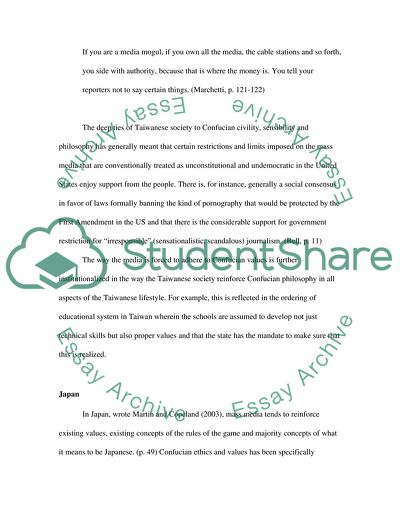Cite this document
(The Confucian Ethos in the Asian Mass Media Report, n.d.)
The Confucian Ethos in the Asian Mass Media Report. https://studentshare.org/media/1738906-the-media-in-much-of-east-and-southeast-asia-stand-in-harmony-with-confucian-philosphy-which-stresses-consensus-and-cooperation-unlike-the-western-medias-dedication-to-individual-freedom-and-rights-heuvel-dennis-1993-iiiasiana-compla
The Confucian Ethos in the Asian Mass Media Report. https://studentshare.org/media/1738906-the-media-in-much-of-east-and-southeast-asia-stand-in-harmony-with-confucian-philosphy-which-stresses-consensus-and-cooperation-unlike-the-western-medias-dedication-to-individual-freedom-and-rights-heuvel-dennis-1993-iiiasiana-compla
(The Confucian Ethos in the Asian Mass Media Report)
The Confucian Ethos in the Asian Mass Media Report. https://studentshare.org/media/1738906-the-media-in-much-of-east-and-southeast-asia-stand-in-harmony-with-confucian-philosphy-which-stresses-consensus-and-cooperation-unlike-the-western-medias-dedication-to-individual-freedom-and-rights-heuvel-dennis-1993-iiiasiana-compla.
The Confucian Ethos in the Asian Mass Media Report. https://studentshare.org/media/1738906-the-media-in-much-of-east-and-southeast-asia-stand-in-harmony-with-confucian-philosphy-which-stresses-consensus-and-cooperation-unlike-the-western-medias-dedication-to-individual-freedom-and-rights-heuvel-dennis-1993-iiiasiana-compla.
“The Confucian Ethos in the Asian Mass Media Report”. https://studentshare.org/media/1738906-the-media-in-much-of-east-and-southeast-asia-stand-in-harmony-with-confucian-philosphy-which-stresses-consensus-and-cooperation-unlike-the-western-medias-dedication-to-individual-freedom-and-rights-heuvel-dennis-1993-iiiasiana-compla.


